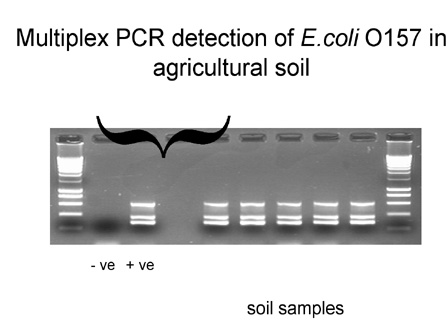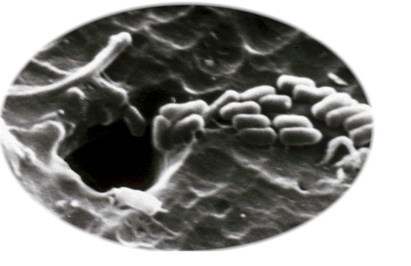|
|
Pathogens in the Environment
Project leader: Dr Jenny Ritchie (neé Hall) Contact Prof K. Killham
Project start date: January 1999 - November 2000
Objective: The detection, survival and movement of human pathogens in soil and organic wastes.
Introduction:
The persistence and movement of verotoxin producing Escherichia coli O157 in soil has become a major concern with regard to the  spread of this infectious and highly virulent pathogen. The major pathways to humans are direct contact with animals or indirect contact with contaminated foods, soil or water. Bacterial and firefly bioluminescence has been widely
exploited as in marker systems for detection and tracking of cells in the environment. Consequently this project set out to produce a chromosomally lux-marked strain of E.coli to be used for microcosm experimentation into its persistence and survival. This has been successfully achieved (Ritchie et al.) spread of this infectious and highly virulent pathogen. The major pathways to humans are direct contact with animals or indirect contact with contaminated foods, soil or water. Bacterial and firefly bioluminescence has been widely
exploited as in marker systems for detection and tracking of cells in the environment. Consequently this project set out to produce a chromosomally lux-marked strain of E.coli to be used for microcosm experimentation into its persistence and survival. This has been successfully achieved (Ritchie et al.)
The project benefited from collaboration with Dr David Acheson of the Boston Medical  Institute, USA and resulted in Dr Ritchie making the first chromosomally lux-marked strain of E. coli O157 in the world. Dr Ritchie has subsequently left the initiative for a position in the US. Work on the persistence and survival of
E. coli O157 has been very successful in attracting additional funding of £150k SEERAD grant to investigate private water supplies and an additional £220k grant from the BBSRC on E. coli survival on wastes amended soil. Institute, USA and resulted in Dr Ritchie making the first chromosomally lux-marked strain of E. coli O157 in the world. Dr Ritchie has subsequently left the initiative for a position in the US. Work on the persistence and survival of
E. coli O157 has been very successful in attracting additional funding of £150k SEERAD grant to investigate private water supplies and an additional £220k grant from the BBSRC on E. coli survival on wastes amended soil.

Publications:
Hall, J.M., Beaton, Y., Glover, L.A. and Killham, K. (2000) Dispersal of E. coli O157 in soil and contamination of water. SCIEH Weekly Report, Supplement 34, 26-27.
Ritchie, J., Beaton, Y, Shepherd, J., Glover, L.A., Prosser, J.I., Killham, K. & Campbell, G.R. Plasmid and chromosomally encoded luminescence marker systems as a risk assessment tool for studies of Escherichia coli O157:H7 in the environment. Journal of Applied Microbiology (submitted)
Grants:
Survival and dispersal of E. coli O157 in Scottish agricultural soils, and potential for contamination of private water supplies. SEERAD, 1999-2002, £149,986.
Collaborations/Contacts:
Dr David Acheson of the Boston Medical Institute, USA.
|